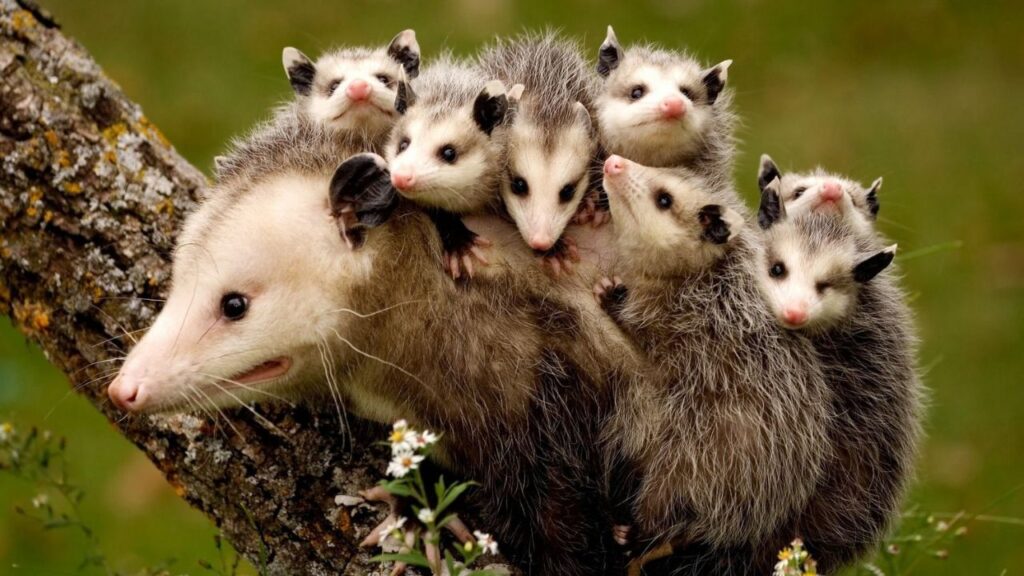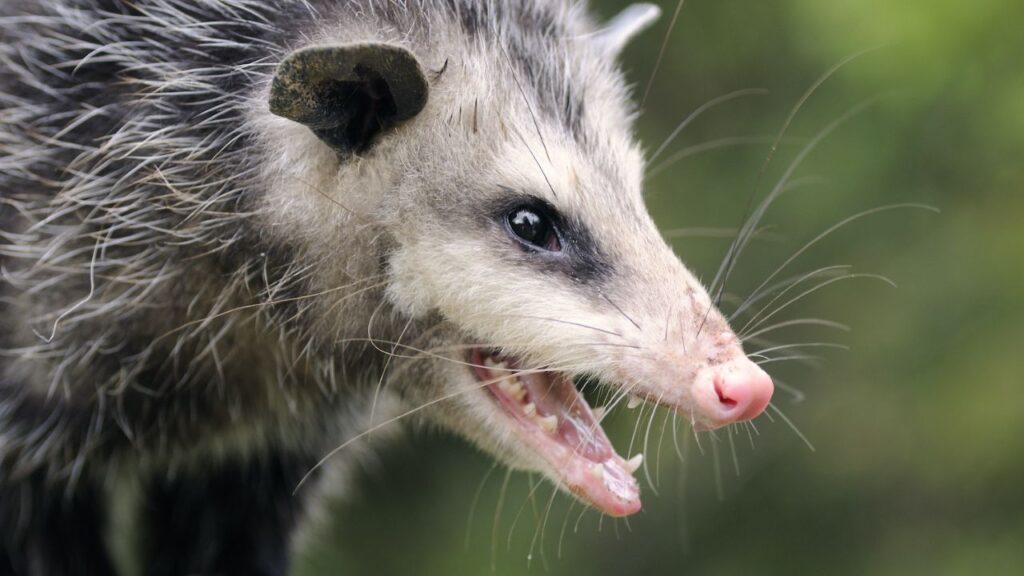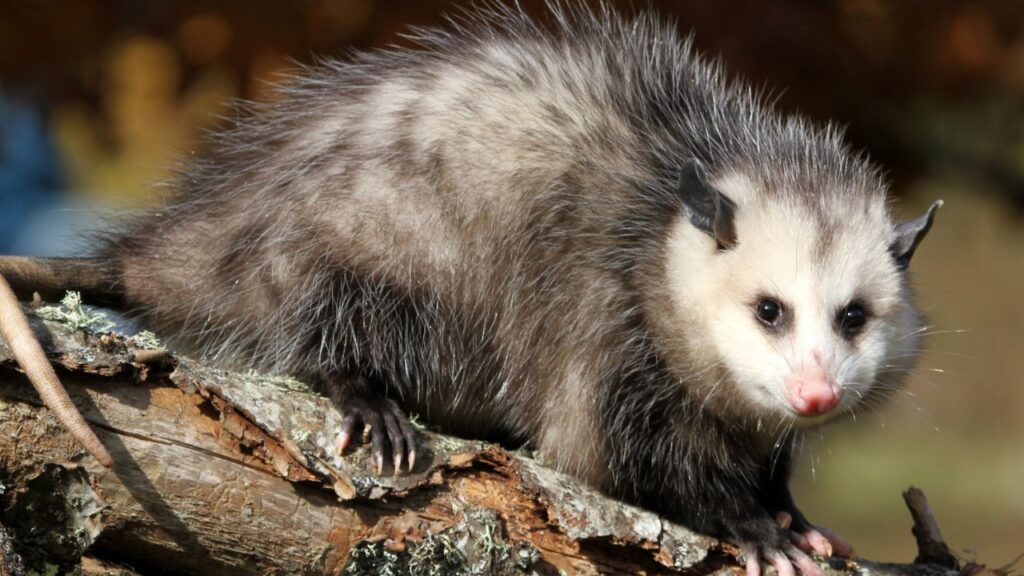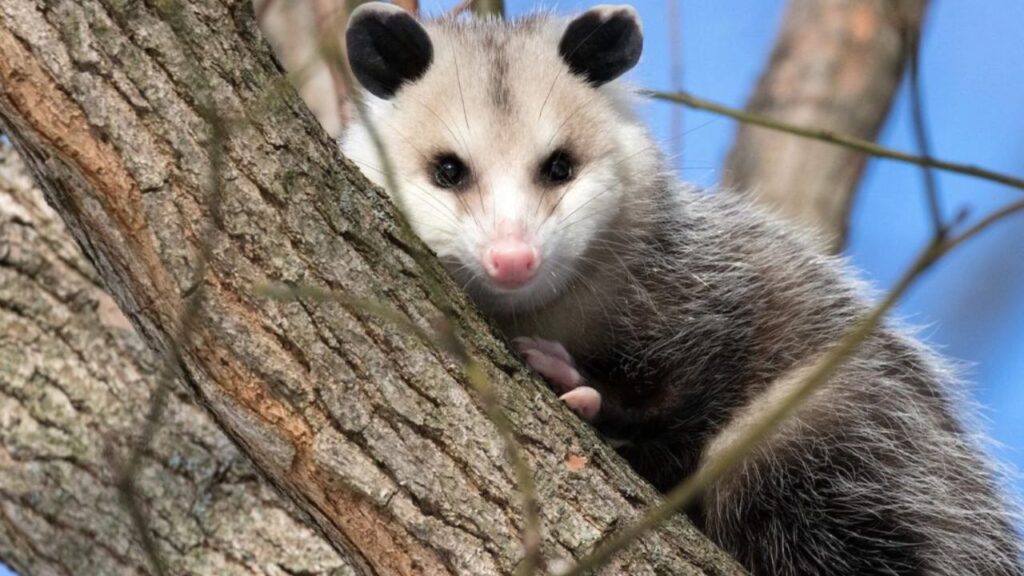Do Opossums Attack Humans? Opossums are generally non-aggressive and unlikely to attack humans; they prefer to play dead or flee when threatened.
Opossums are fascinating creatures that often evoke mixed reactions from people. With their rat-like tails, nocturnal habits, and sometimes eerie hiss, they can easily be mistaken for aggressive pests.
However, their true nature is far more complex and less threatening than many might assume. Understanding opossum behavior is crucial, especially when they are increasingly found in suburban and urban areas.
This article delves into whether opossums attack humans, what to expect from these encounters, and how to handle them safely.
Contents
What Are Opossums?
Overview of Opossums:
Opossums, particularly the Virginia opossum, are the only marsupials native to North America.
These unique creatures have a distinctive appearance characterized by grayish-white fur, a pointed snout, and a long, prehensile tail that they use for gripping branches.
Adult opossums typically weigh between 4 to 14 pounds and measure about 2 to 3 feet in length, including the tail.
Opossums are omnivores, meaning they have a varied diet that includes fruits, vegetables, insects, small mammals, and even carrion. Their adaptability to different food sources has allowed them to thrive in various environments, from forests to urban neighborhoods.
Their nocturnal nature means they are most active at night, often seen foraging in garbage bins or scavenging for food. [Do Opossums Attack Humans?]
Opossums’ Role in the Ecosystem:
Despite their sometimes alarming appearance, opossums play a crucial role in the ecosystem. They are nature’s clean-up crew, helping to keep the environment clean by consuming decaying matter, including dead animals.
This scavenging behavior helps prevent the spread of diseases that can arise from decaying carcasses. [Do Opossums Attack Humans?]
One of the lesser-known benefits of opossums is their role in controlling tick populations. Ticks are a major vector for diseases like Lyme disease, which can be debilitating to humans.
Opossums are meticulous groomers and can consume thousands of ticks each season, significantly reducing the risk of tick-borne illnesses in areas where they are present.

Do Opossums Attack Humans?
General Behavior:
Opossums are generally shy and non-aggressive animals. When they encounter humans, their first instinct is to avoid confrontation.
Opossums are not predators; they are opportunistic feeders who prefer to scavenge for food rather than hunt or engage in conflicts. Their slow, deliberate movements are a reflection of their cautious nature.
In most cases, when an opossum encounters a human, it will try to escape or hide. If cornered or unable to flee, the opossum may employ various defensive strategies to protect itself.
However, direct aggression towards humans is extremely rare, and opossums typically seek to avoid any direct confrontation. [Do Opossums Attack Humans?]
Defensive Mechanisms:
Opossums have several fascinating defensive mechanisms that help them avoid predators and other threats. The most well-known of these is “playing dead,” or thanatosis.
When an opossum feels threatened and sees no means of escape, it may collapse and lie motionless, with its mouth open and tongue hanging out.
This act is so convincing that many predators will lose interest, believing the opossum to be dead and possibly diseased.
This behavior is an involuntary response, triggered by extreme fear. The opossum enters a catatonic state, during which it is unconscious and unaware of its surroundings.
The duration of this state can vary, lasting anywhere from a few minutes to several hours. Once the perceived threat has passed, the opossum will gradually regain consciousness and cautiously move away.
Another defensive mechanism opossums use is a loud, menacing hiss accompanied by baring their sharp teeth. While this display may seem aggressive, it is more of a bluff intended to scare off potential threats.
The opossum’s goal is to appear as intimidating as possible, discouraging predators or humans from approaching further. [Do Opossums Attack Humans?]
Rare Cases of Aggression:
While opossums are generally non-aggressive, there are rare cases where they might exhibit defensive aggression. [Do Opossums Attack Humans?]
This typically occurs when the opossum feels cornered, trapped, or if its young are threatened. In such situations, the opossum may resort to biting as a last line of defense.
However, it’s important to note that opossums lack the predatory instincts found in more aggressive animals. Their bites are not typically forceful, and they lack the strong jaws of carnivorous animals.
A bite from an opossum is more likely to result in a minor wound rather than significant injury.
Even in these rare instances, the opossum’s primary goal is to escape rather than engage in a prolonged conflict.

Are Opossum Attacks Dangerous?
Bite Severity:
Although opossums have sharp teeth, their bites are not particularly dangerous. A bite from an opossum is more likely to cause minor puncture wounds, similar to a cat scratch.
The wounds may bleed slightly but are not typically severe. However, as with any animal bite, it’s important to treat the wound properly to prevent infection.
If bitten by an opossum, the first step is to wash the wound thoroughly with soap and water. This helps remove any bacteria that may have been introduced into the wound.
Applying an antiseptic and covering the bite with a clean bandage is also recommended.
While the risk of serious infection from an opossum bite is low, it’s advisable to seek medical attention, especially if the wound shows signs of infection, such as redness, swelling, or increased pain.
Health Concerns:
Opossums are not known to carry many of the diseases that other wild animals might transmit.
Their body temperature is lower than that of many mammals, making them less likely to harbor the rabies virus.
While cases of rabies in opossums are exceedingly rare, they are still wild animals, and it’s important to exercise caution. [Do Opossums Attack Humans?]
Opossums can, however, carry other diseases, such as leptospirosis and salmonella. Leptospirosis is a bacterial infection that can be transmitted through contact with the urine of infected animals.
Symptoms in humans can range from mild flu-like symptoms to more severe conditions like liver damage or meningitis.
Salmonella, commonly associated with reptiles and poultry, can also be found in opossums, particularly in their droppings.
Proper hygiene, such as washing hands after handling anything that might be contaminated, can minimize the risk of contracting these diseases.

How to Prevent Encounters with Opossums
Securing Your Property:
One of the most effective ways to prevent encounters with opossums is to make your property less attractive to them.
Opossums are drawn to easy food sources, so securing garbage bins with tight-fitting lids is essential. If possible, store trash cans in a garage or shed, especially overnight, when opossums are most active.
Pet food left outside can also attract opossums. If you feed pets outdoors, remove any uneaten food and store pet food in sealed containers.
Fallen fruit from trees and bird feeders can also be appealing to opossums, so keeping your yard clean and free of debris is a good preventive measure.
Opossums may seek shelter in dark, quiet places like under decks, porches, or sheds. To prevent them from making a home on your property, inspect these areas for any gaps or openings that could provide entry.
Sealing off these entry points with materials like wire mesh or boards can deter opossums from taking up residence.
Safe Interaction:
If you do encounter an opossum, it’s important to remain calm and give the animal space to retreat. [Do Opossums Attack Humans?]
Opossums are not fast runners, so they may not immediately flee. Instead, they may freeze and assess the situation.
Avoid making sudden movements or loud noises, as this could startle the opossum and trigger a defensive response. [Do Opossums Attack Humans?]
In the unlikely event that an opossum feels threatened and plays dead, do not attempt to move or touch the animal.
Opossums in this state are unconscious and highly vulnerable. It’s best to leave the opossum alone and give it time to recover and move on when it feels safe.
If an opossum has entered your home, the best approach is to leave an exit open and allow the animal to find its way out. Close off any other rooms to prevent the opossum from wandering further into your home.
If the opossum does not leave on its own, contacting a local wildlife control service is advisable. Professionals can safely remove and relocate the opossum without causing harm to the animal or your property.

Final Verdict
Opossums are unlikely to attack humans. Their natural behavior leans toward avoidance rather than confrontation, and they are equipped with various defensive mechanisms that do not involve direct aggression.
While opossums may bite in rare cases where they feel cornered or threatened, these instances are uncommon and typically not severe.
Understanding opossum behavior and taking preventive measures can ensure peaceful coexistence with these beneficial creatures. [Do Opossums Attack Humans?]
See Also: Do Orangutans Attack Humans? Myths and Realities Explained!
FAQs
Do opossums carry diseases?
Yes, opossums can carry diseases like leptospirosis and salmonella, but they are less likely to carry rabies due to their low body temperature. [Do Opossums Attack Humans?]
What should I do if an opossum bites me?
Clean the wound immediately with soap and water, apply an antiseptic, and cover it with a clean bandage. Seek medical attention to prevent infection.
Can opossums harm pets?
Opossums are generally non-aggressive toward pets, but they may defend themselves if cornered by a cat or dog. Supervising pets when they are outside can prevent encounters.
Are opossums aggressive by nature?
No, opossums are not aggressive by nature. They are more likely to flee or play dead when threatened rather than engage in aggressive behavior.
How can I safely remove an opossum from my property?
The best way to remove an opossum is to make your property less inviting by removing food sources and securing trash. If an opossum enters your home, contact local wildlife control for safe removal.
Conclusion: Do Opossums Attack Humans?
Opossums are often misunderstood animals that, despite their unsettling appearance, pose little threat to humans.
Their interactions with people are typically harmless, and they play a valuable role in the ecosystem.
By understanding opossum behavior and taking simple precautions, you can coexist peacefully with these unique marsupials. [Do Opossums Attack Humans?]
Whether you’re an urban dweller or live in a rural area, knowing how to handle opossum encounters can help protect both you and these beneficial animals.

Hello, I am Rosa Ellis, a mother of two and a wildlife blogger. I grew up in New York City, but I love exploring forests. I’ve traveled to places like Yellowstone National Park and the Amazon Rainforest to see animals up close. I know a lot about animal behavior and which animals can be dangerous to humans. Thanks for visiting my blog!

